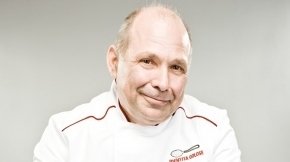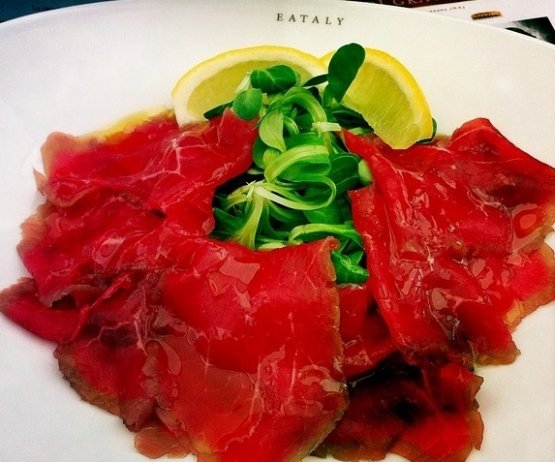Sergio Capaldo of La Granda, an association formed by over sixty breeders, born in the mid Nineties as part of a project to relaunch the Razza Bovina Piemontese, and Marco Stabile, the 100% Tuscan starred chef from Ora d'aria in Florence, are talking a lot these days. And speaking with both of them, one after the other, early in the morning, after a meeting between the two the night before, can give an idea of the passion and curiosity with which they are preparing themselves for their lecture at the 2015 Identità Milano congress.
The context will be the day dedicated to Identità Estreme, on Tuesday 10th February, the subject will of course be meat. Yet speaking about it with Sergio Capaldo is special. Because, in the words of Marco Stabile, «for Sergio everything starts from the land and the way it is cultivated. So a good meat can only derive from a good agriculture».
Indeed Capaldo piles it on: «In order to have an intelligent cuisine, in order to move towards that “healthy intelligence” that is the title of the eleventh edition of Identità Milano, it is essential to have an intelligent agriculture. In Italy we are far behind in the valorisation of the unique biodiversity of our country. It’s the bacteria, first of all, that make the difference, the microbioma: this world living inside us and inside our land and which makes us different from everyone else.»

Sergio Capaldo is also Slow Food’s livestock technician on top of supplying Eataly’s stores with La Granda meat
Intelligent agriculture, according to
Capaldo, is therefore the one that «goes back to using the agronomic techniques that have made Italy great. Crop rotation was discovered here, in the 19th century. Instead, we have stopped working with the soil, using fertilizers and medicines as surrogates. A good pasture for the animals is the result of a long and complex work, which includes a human intervention in harmony with nature. What the animals eat is something we will later eat ourselves.»
Respect and the rediscovery of agronomic traditions together with the progress made in science and technology: «We are currently working and researching on hay, discovering that animals can eat much less but much better. The nutrients in the meat we will bring at
Identità Milano, which is analysed at the Università di Pisa, are completely different from those of other meats, and this allows us to eat less and better too, thanks to the greater sense of fullness we get from eating high quality raw meat.»
The result of this approach has long been clear in the quality of the
La Granda meat, on which
Marco Stabile has been working for a long time: «I’ve been working with
La Granda for 15 years. Despite being Tuscan I chose to favour Piedmontese meat and a special approach.
Sergio always used me to test his new ideas, we often confronted ourselves on many topics and then faced them with the same passion. For the lecture at
Identità Golose I will research a way of presenting his extraordinary raw materials in different ways, from raw to crispy.»
And while cultivating the land, and therefore the meat, is essential, its transformation, through dry aging, is just as important, according to
Sergio Capaldo.
Marco Stabile was fascinated by the tenderness of the meat that
Capaldo brought him: «I tasted steaks from cattle that were 109 months old. Despite their age, thanks to a three-month long hanging, the meat is like butter: soft and with a beautiful scent.»

A photo of Gradisca, the meat dry aged in a vacuum with a special marinade made with Lapsang Souchong tea and acacia honey
«If an animal eats well and lives well – says
Sergio Capaldo – it can live longer and then, thanks to various dry aging techniques, both with and without vacuum, it is possible to obtain great results. Thanks to vacuum we produce “
Gradisca”, using very tannic Lapsang Souchong tea and mountain acacia honey. The meat, thus brushed and kept in a vacuum, matures slowly and becomes very tender, ready to be eaten as a carpaccio, without any condiment.»
Those who visit the butcher shops inside
Eataly have seen the fridges in which special cuts of meat are kept: «It’s a sort of dry-aged hanging, made with an Italian machine called
MaturMeat, which works very well with the balance between humidity, temperature and ventilation. We use these techniques not only in those fridges but also in our refrigeration rooms. And in this case too, it is a technology that makes a totally traditional approach to meat maturation more precise and effective.»